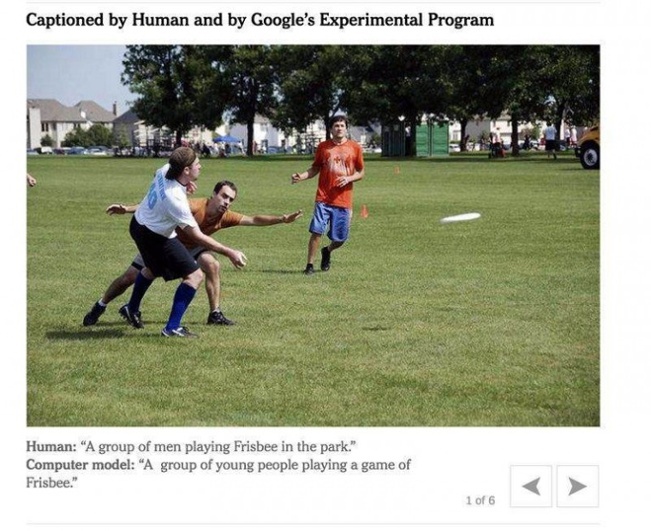By Restb.ai on 25 October 2016
Artificial Intelligence seemed to promise so much, robot butlers or a useful companion that comes as part of the fridge. Intelligent technology seemed to be industry standard by about 2015, according to the popular culture of the early 90s...Yet the reality has never quite lived up to the futuristic fantasy.
The rise of artificial intelligence has been a series of small evolutions, not one sweeping, chrome-brushed revolution. The steady creep of AI can be easy to ignore, yet its impact is starting to be felt. Millions have already welcomed AI into their home with the rise of personal tools such as Siri. Global industries are now starting to see the user experience and the role of its workers being permanently changed by AI. One such industry reaping the rewards and feeling the impact of artificial intelligence is real estate.
Small developments and innovations are mounting to form a wave that is about to make some serious changes to the way the real estate industry operates.
Here are 5 ways that artificial intelligence is shaking up the real estate business TODAY.
Machine Learning in Search Engines
For the purists, true artificial intelligence requires something that can first replicate human thinking, and then exceed it. But, there are multitudes. The first example of real estate Artificial Intelligence that is making waves is capable of machine-learning but is not true AI in the strictest form.
This is Rank Brain: A search tool that grows and learn as you use it. Real estate searches now start at Google rather than in an office. Machine learning tools such as Rank Brain process more than just your search query, they digest the information on the page you are being directed to. The contents of the page are not just scoured to match the search, but checked for signs and signifiers that the page will answer the meaning behind the search. There are over 10,000 of these factors built into every search.
Finding your exact needs, plus the inexpressible criteria that make up your perfect home has been a problem for the real estate industry for years. A search tool that understands your needs and grows with your preferences is now commonplace, meaning customers are better equipped than ever to find properties that meet their needs in the very first step of the searching process.
Smart Searching
‘‘ The stage at which even the greenest property buyer or seller requires the intervention of a profession broker is being pushed further and further back.’’
As well as Google queries, other searches have grown steadily more sophisticated. Where clients would once be happy to filter a list of properties by area or price, they now want to be able to add in deeper layers such as the likelihood of a high return on investment. Artificial intelligence can build these layers into the results of searches before a customer even thinks to ask them. The stage at which even the greenest property buyer or seller requires the intervention of a profession broker is being pushed further and further back.

First, search engines use the key facts to determine an accurate base result, based on the initial search filters. Then the next step is to build in signifiers for taste and personal preference. New software such as Citybldr uses over 180 factors to determine the value of not just the property, but the development potential of the land accorded to it. Deep learning can then identify common word clusters and phrase partners to understand a description and the connotations as well as denotations behind the words.
The fact is that these tools are currently disparate and don’t talk to each other, but, the rise of AI in the real estate sector will lead to an incredible network of shared information. The implication being that questions that would usually be handled by broker will be answered from a client’s initial research.
Image Recognition
Real estate is built on images. They are what sell properties and the first thing any client wants to see. But, results from search engines like Google are derived from written descriptions of an image’s content rather than the image itself. This leads to variable descriptions, inaccuracies and human error. Ask 10 people to caption a property image, no two will ever be the same.
Artificial intelligence in image recognition software has now reached the stage where it can understand, process, and describe images with an unnerving degree of accuracy. More than just gauging light or color, the AI can identify actions, people, animals, even emotion or mood.

Imagine a world where your images don’t require classification and description, and your clients are better equipped to find images that lead them deeper into the buying process. As well as eliminating the manual work of categorizing and describing images, if your system is describing the images, it is then far better equipped to process search results using these descriptions. You now have the power to classify, tag and organize your images in real time. With millions of image to process, a practical result of this software for the industry is the removal of hours of manual work, labeling and cataloging images and a more accurate user searching experience for your customers.
This is the true function of artificial intelligence, to perform a task as well as or better than a human with a higher degree of accuracy in less time. This is likely to have huge positive ramifications for anyone involved in the real estate industry.
Chat Bots
No discussion of Artificial Intelligence can be complete without mentioning the Turing Test. Developed by the breaker of the Enigma code and mathematical hero, Alan Turing, his eponymous test is deceptively simple: convince 30% of people that the machine they are talking to is, in fact, a human.
This milestone was reached in 2014 and since then chatbot technology has reached a level sophisticated enough to be introduced to the commercial sector. Initial tasks in the real estate process such as booking appointments, providing standard property information can now all be handled by AI.

The next step in this evolution is R.O.O.F, the real estate office of the future. Roof uses Artificial intelligence to automate lead generation for real estate brokers. Driven by property and consumer data, Roof can predict the next houses to be listed for sale. Their system uses over 250 data points for every property owner, using predictive analytics to identify prospects with the highest likelihood of listing their property for sale.
The initial marketing outreach is then automated and performed by your own bot, feeding more data results into the system as conversions and losses are measured. This leaves the broker with a series of highly qualified leads that have already started their journey along the sales funnel.
Property Suggestions
People will tell you there is no future in AI because artificial intelligence has been that it can’t handle more complicated, nuanced questions or take subjectivity into account. Artificial intelligence that can do more than collating and displaying information, but process it and make decisions with a higher degree of accuracy than a human is too far off to take seriously in the commercial sector.
For the real estate industry, this watershed mark has already been reached. A broker was pitted against a bot to suggest properties to a client based on previous searches. The judge preferred the bot’s properties and couldn’t guess which were suggested by human or bot.

Using a random forest approach, where customer decision trees are estimated and plotted, the AI can use the analytic data of previous searches and preferences to drill down into the most accurate results. This is first based on property information and then even more human and subjective descriptions found in the listing results. The result is a more accurate, faster and satisfying user experience with less guesswork, trial and error, and wasted human endeavor.
These changes to an established industry can be daunting, especially when they seem to sacrifice human knowledge for, as yet, unperfected processes. But, even when AI can seem clunky and ill-informed, it is just the start of a process. True AI grows with every decision it makes. For an artificial intelligence system, providing results that are deemed useless to the end client is not a failure, it is simply more data that will help it get even more accurate in the future.
Furthermore, the rise of artificial intelligence does not guarantee the death of the broker as we know it, but rather a smoother user experience. Certain tasks can be given over to the machines, meaning a more dedicated level of service at the human stage of the process. The implication is that your clients, people searching for real estate can personalize their funnel at a much earlier stage. They can use this artificial intelligence to qualify their requests before even engaging with the broker.
Despite automation, machine and deep learning, buying a home is still a very human experience. The future of the real estate industry lies in the automation of the early steps and a higher level of personalization and dedicated service when human interaction is required.
Real estate has already felt the change brought by artificial intelligence. The struggle now lies in harnessing its uses without sacrificing the human elements required to create the connection and trust required in order to succeed.




comments